The Way of Big Data
big data《大数据时代》读书笔记——精华观点和核心语句

big data《大数据时代》精华观点和核心语句不再追求精确度,不再追求因果关系,而是承认混杂性,探索相关关系。
如同工业革命要开放物质交易、流通一样,开放、流通的数据是时代趋势的要求。
开放所带来的改变远远大于拥有权和隐私性保护所带来的问题。
要全体不要抽样,要效率不要绝对精确,要相关不要因果。
作者认为相关关系比因果关系重要,译者表示反对,认为放弃因果等于放弃人类的智力优势,是末日之始。
导致相关关系比因果关系重要的原因在于,我们机器学习和以结果为导向的研究思路误导人类。
公共医疗:Google通过分析03到08的流感相关搜索词条,将45中词条组合输入一个数学模型之后,得到的流感预测数据和官方统计数据有97%吻合。
09年判断准确,及时预报流感。
商业:farecast利用十万亿条飞机票价记录,预测飞机票价准确度高达75%,利用farecast购买机票的旅客平均每张机票节省50美元。
不再需要一致性的数据库和僵化的层次结构,不再需要结构化查询语言sql,最新的数据库为非关系型数据库nosql。
美国股市每天成交量高达70亿股,其中三分之二都是由数学模型和算法之上的计算机程序自动完成的,这些程序利用海量数据来预测利益和降低风险。
数据爆炸式增长,绝大部分为数字信息,极少部分为模拟数据。
数据每三年多翻一番。
数据规模的量变产生质变,就比如万有引力对生物体大小的关系,纳米技术对现实生活物质的性质有所改变一样,空气阻力和重量和形状关系一样。
大数据的核心在于预测,把数学算法运用到海量数据中来预测事情发生的可能性。
不再依赖于随机采样,不在热衷于追求精确度。
并非完全放弃精确度,只是不再沉迷于此。
不在热衷于寻找因果关系,而是寻找事物之间的相关性。
数据化意味着从一切事物中汲取数据,甚至包括我们以前认为和“信息”搭不上边的事情。
比方说,一个人所在的位置、引擎的振动、桥梁的承重等等。
如同电影《点石成金》中,棒球球探们在统计学家面前相形见绌——直觉的判断被迫让位于精准的数据分析。
大数据英文版简版
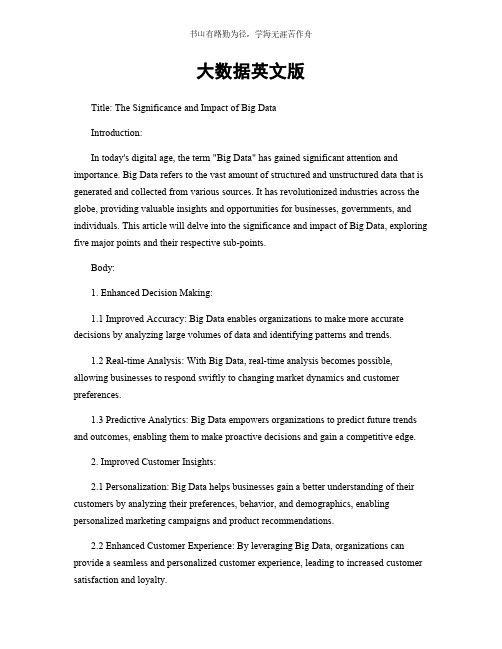
大数据英文版Title: The Significance and Impact of Big DataIntroduction:In today's digital age, the term "Big Data" has gained significant attention and importance. Big Data refers to the vast amount of structured and unstructured data that is generated and collected from various sources. It has revolutionized industries across the globe, providing valuable insights and opportunities for businesses, governments, and individuals. This article will delve into the significance and impact of Big Data, exploring five major points and their respective sub-points.Body:1. Enhanced Decision Making:1.1 Improved Accuracy: Big Data enables organizations to make more accurate decisions by analyzing large volumes of data and identifying patterns and trends.1.2 Real-time Analysis: With Big Data, real-time analysis becomes possible, allowing businesses to respond swiftly to changing market dynamics and customer preferences.1.3 Predictive Analytics: Big Data empowers organizations to predict future trends and outcomes, enabling them to make proactive decisions and gain a competitive edge.2. Improved Customer Insights:2.1 Personalization: Big Data helps businesses gain a better understanding of their customers by analyzing their preferences, behavior, and demographics, enabling personalized marketing campaigns and product recommendations.2.2 Enhanced Customer Experience: By leveraging Big Data, organizations can provide a seamless and personalized customer experience, leading to increased customer satisfaction and loyalty.2.3 Targeted Marketing: Big Data enables businesses to target specific customer segments more effectively, resulting in higher conversion rates and improved marketing ROI.3. Cost Reduction and Efficiency:3.1 Operational Efficiency: Big Data analytics helps identify inefficiencies in business processes, enabling organizations to streamline operations and reduce costs.3.2 Resource Optimization: By analyzing data, businesses can optimize resource allocation, minimizing waste and improving overall efficiency.3.3 Fraud Detection: Big Data analytics plays a crucial role in detecting fraudulent activities, reducing financial losses, and enhancing security measures.4. Innovation and New Opportunities:4.1 Product Development: Big Data provides valuable insights into customer needs and preferences, facilitating the development of innovative products and services.4.2 Market Expansion: By analyzing Big Data, organizations can identify new market opportunities and expand their customer base.4.3 Competitive Advantage: Big Data enables businesses to gain a competitive advantage by uncovering market trends, consumer sentiments, and competitor strategies.5. Healthcare and Scientific Advancements:5.1 Disease Prevention and Treatment: Big Data analytics helps identify disease patterns, predict outbreaks, and develop effective prevention and treatment strategies.5.2 Drug Discovery: Big Data plays a vital role in accelerating drug discovery processes by analyzing vast amounts of genetic and clinical data.5.3 Precision Medicine: By analyzing individual patient data, Big Data facilitates personalized treatment plans, improving patient outcomes and reducing healthcare costs.Conclusion:In conclusion, Big Data has emerged as a game-changer in various industries, revolutionizing decision-making processes, customer insights, cost reduction, innovation, and advancements in healthcare and science. Its significance and impact are undeniable, providing organizations with valuable opportunities to gain a competitive edge, improve efficiency, and drive growth. As we continue to generate and collect massive amounts of data, harnessing the power of Big Data will remain crucial for success in the digital era.。
【独家原文翻译56页版】麦肯锡大数据:创新、竞争和生产力的下一个前沿(原文翻译)
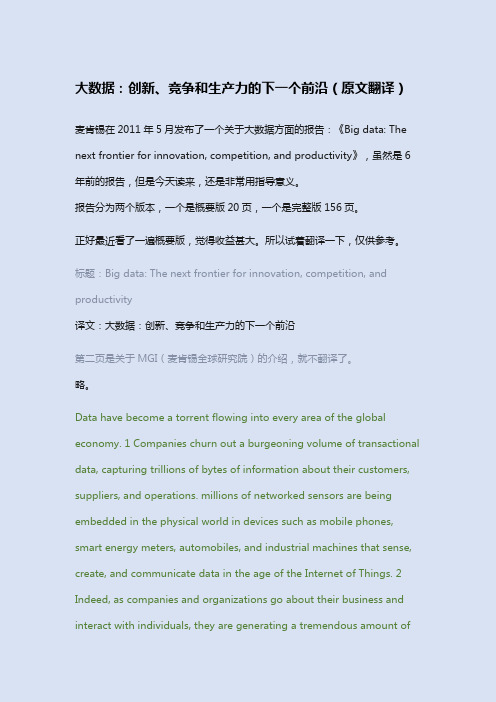
大数据:创新、竞争和生产力的下一个前沿(原文翻译)麦肯锡在2011年5月发布了一个关于大数据方面的报告:《Big data: The next frontier for innovation, competition, and productivity》,虽然是6年前的报告,但是今天读来,还是非常用指导意义。
报告分为两个版本,一个是概要版20页,一个是完整版156页。
正好最近看了一遍概要版,觉得收益甚大。
所以试着翻译一下,仅供参考。
标题:Big data: The next frontier for innovation, competition, and productivity译文:大数据:创新、竞争和生产力的下一个前沿第二页是关于MGI(麦肯锡全球研究院)的介绍,就不翻译了。
略。
Data have become a torrent flowing into every area of the global economy. 1 Companies churn out a burgeoning volume of transactional data, capturing trillions of bytes of information about their customers, suppliers, and operations. millions of networked sensors are being embedded in the physical world in devices such as mobile phones, smart energy meters, automobiles, and industrial machines that sense, create, and communicate data in the age of the Internet of Things. 2 Indeed, as companies and organizations go about their business and interact with individuals, they are generating a tremendous amount of digital“exhaust data,”i.e., data that are created as a by-product of other activities. Social media sites, smartphones, and other consumer devices including PCs and laptops have allowed billions of individuals around the world to contribute to the amount of big data available. And the growing volume of multimedia content has played a major role in the exponential growth in the amount of big data (see Box 1, “What do we mean by ‘big data’?”). Each second of high-definition video, for example, generates more than 2,000 times as many bytes as required to store a single page of text. In a digitized world, consumers going about their day—communicating, browsing, buying, sharing, searching—create their own enormous trails of data.译文:数据已成为流入全球经济各个领域的激流。
大数据的应用英语作文
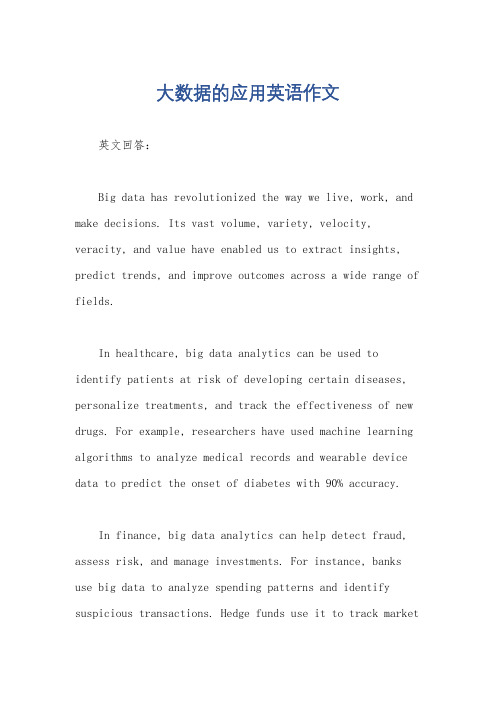
大数据的应用英语作文英文回答:Big data has revolutionized the way we live, work, and make decisions. Its vast volume, variety, velocity, veracity, and value have enabled us to extract insights, predict trends, and improve outcomes across a wide range of fields.In healthcare, big data analytics can be used to identify patients at risk of developing certain diseases, personalize treatments, and track the effectiveness of new drugs. For example, researchers have used machine learning algorithms to analyze medical records and wearable device data to predict the onset of diabetes with 90% accuracy.In finance, big data analytics can help detect fraud, assess risk, and manage investments. For instance, banks use big data to analyze spending patterns and identify suspicious transactions. Hedge funds use it to track markettrends and make informed trading decisions.In manufacturing, big data analytics can optimize production processes, reduce waste, and improve quality. For example, a factory might use sensors to collect data on machine performance and product defects. By analyzing this data, they can identify bottlenecks, fix problems, and improve efficiency.In retail, big data analytics can help businessestarget customers more effectively, personalize marketing campaigns, and optimize pricing strategies. For example, an online retailer might use big data to analyze customer purchase history and demographics to recommend products and offer discounts.In government, big data analytics can inform policy decisions, improve service delivery, and fight crime. For instance, a city might use big data to analyze traffic patterns and identify areas of congestion. By investing in infrastructure improvements, they can reduce traffic and improve the quality of life for residents.The applications of big data are endless. As we continue to generate and collect more data, we will unlock even greater potential for innovation, efficiency, and societal progress.中文回答:大数据的应用。
BigData大数据介绍全英
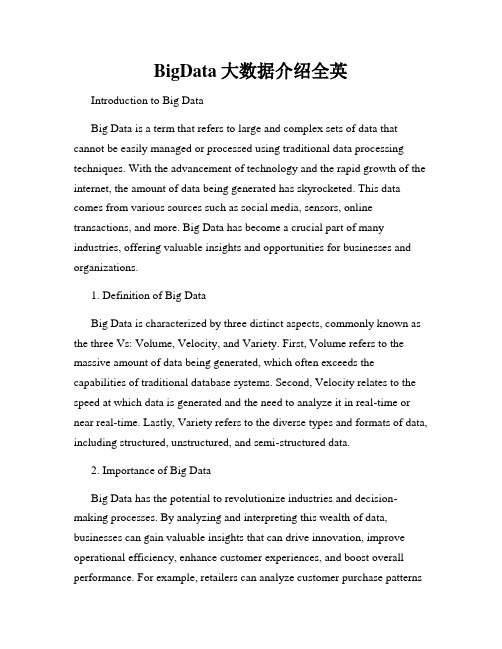
BigData大数据介绍全英Introduction to Big DataBig Data is a term that refers to large and complex sets of data that cannot be easily managed or processed using traditional data processing techniques. With the advancement of technology and the rapid growth of the internet, the amount of data being generated has skyrocketed. This data comes from various sources such as social media, sensors, online transactions, and more. Big Data has become a crucial part of many industries, offering valuable insights and opportunities for businesses and organizations.1. Definition of Big DataBig Data is characterized by three distinct aspects, commonly known as the three Vs: Volume, Velocity, and Variety. First, Volume refers to the massive amount of data being generated, which often exceeds the capabilities of traditional database systems. Second, Velocity relates to the speed at which data is generated and the need to analyze it in real-time or near real-time. Lastly, Variety refers to the diverse types and formats of data, including structured, unstructured, and semi-structured data.2. Importance of Big DataBig Data has the potential to revolutionize industries and decision-making processes. By analyzing and interpreting this wealth of data, businesses can gain valuable insights that can drive innovation, improve operational efficiency, enhance customer experiences, and boost overall performance. For example, retailers can analyze customer purchase patternsto optimize inventory management, while healthcare providers can leverage Big Data to improve patient care and outcomes.3. Applications of Big DataBig Data finds its application across various sectors, including but not limited to:3.1. Marketing and Advertising: Big Data enables marketers to understand consumer behavior, target specific demographics, and personalize advertisements, leading to improved campaign effectiveness and customer engagement.3.2. Healthcare: Analysis of large datasets can identify disease patterns, track outbreaks, and improve patient care through predictive analytics and personalized medicine.3.3. Finance: Financial institutions can utilize Big Data to detect fraudulent activities, assess credit risks, and make more accurate predictions for investments.3.4. Transportation and Logistics: Big Data helps optimize route planning, supply chain management, and fleet efficiency, leading to cost savings and improved delivery times.4. Challenges and ConcernsWhile the benefits of Big Data are substantial, there are also challenges associated with its implementation. Some of the key challenges include:4.1. Data Privacy and Security: As more personal and sensitive data is collected, protecting privacy and ensuring security becomes a criticalconcern. Robust data protection measures are required to safeguard information and ensure compliance with relevant regulations.4.2. Data Quality and Integration: Ensuring the accuracy, reliability, and consistency of Big Data from various sources can be challenging. Proper data integration and preprocessing techniques are essential to obtain meaningful insights.4.3. Skill Gap: The field of Big Data requires individuals with a strong understanding of data analytics, statistics, programming, and business domain knowledge. Addressing the shortage of skilled professionals is vital for successful implementation.5. Future TrendsThe future of Big Data is promising, with continuous advancements in technology and data analytics. Some emerging trends include:5.1. Artificial Intelligence and Machine Learning: AI and ML techniques are being employed to analyze and extract meaningful insights from Big Data, leading to automation, predictive analytics, and improved decision-making processes.5.2. Internet of Things (IoT): The proliferation of IoT devices generates vast amounts of data, contributing to the growth of Big Data. The integration of IoT and Big Data offers opportunities for valuable insights and enhanced connectivity.5.3. Cloud Computing: Cloud-based platforms provide scalable infrastructure and storage capabilities for Big Data analysis, enablingbusinesses of all sizes to leverage its benefits without significant upfront investments.ConclusionBig Data has transformed the way organizations operate and make decisions. Its ability to provide valuable insights and predictive analytics empowers businesses to stay competitive in a rapidly evolving digital landscape. By harnessing the power of Big Data, businesses can unlock opportunities for growth, innovation, and improved performance across various industries.。
大数据时代给我带来的便利和挑战英语作文

大数据时代给我带来的便利和挑战英语作文In the era of big data, we are constantly bombarded with an overwhelming amount of information from various sources. This abundance of data has brought about both convenience and challenges in our daily lives. As we navigate through this digital landscape, it is essential to understand the impact of big data and how it has transformed our world.One of the primary benefits of big data is the enhanced convenience it offers. With the vast amount of data available, we can make more informed decisions and optimize our daily routines. For instance, the use of personalized recommendations on e-commerce platforms allows us to discover products and services that cater to our specific needs and preferences. This not only saves us time and effort but also enhances our overall shopping experience. Similarly, the integration of big data in transportation systems has led to the development of real-time traffic monitoring and route optimization, enabling us to navigate through congested roads more efficiently.Moreover, big data has revolutionized the healthcare industry. By analyzing large datasets, medical professionals can identify patterns, predict disease outbreaks, and develop more personalized treatmentplans. This has led to earlier disease detection, improved patient outcomes, and a more proactive approach to healthcare. The use of wearable devices and mobile applications further empowers individuals to monitor their own health, making it easier to manage chronic conditions and maintain a healthy lifestyle.In the realm of education, big data has transformed the way we approach learning. By analyzing student performance data, educators can tailor their teaching methods to the individual needs of each student, ensuring a more personalized and effective learning experience. Additionally, the use of online learning platforms and adaptive technologies allows students to access a wealth of educational resources and receive immediate feedback on their progress, fostering a more engaging and interactive learning environment.However, the rise of big data also presents significant challenges that we must address. One of the primary concerns is the issue of data privacy and security. As we share more of our personal information online, there is an increased risk of data breaches and unauthorized access to sensitive information. This raises concerns about the protection of individual privacy and the potential misuse of data for malicious purposes. Governments and organizations must implement robust data protection policies and invest in cybersecurity measures to safeguard the privacy of individuals.Another challenge is the potential for bias and discrimination in data-driven decision-making. The algorithms used to analyze big data can perpetuate existing societal biases, leading to unfair or discriminatory outcomes. This issue is particularly prevalent in areas such as employment, lending, and criminal justice, where algorithmic decision-making can have significant consequences for individuals. It is crucial to address these biases and ensure that big data technologies are developed and deployed in an ethical and inclusive manner.Furthermore, the abundance of information can also lead to information overload and cognitive fatigue. With so much data available at our fingertips, it can be overwhelming to sift through and make sense of all the information. This can result in decision paralysis, where individuals struggle to make informed choices due to the sheer volume of options and data points. Developing effective strategies for data management and information processing is essential to navigate this data-rich environment effectively.In conclusion, the era of big data has brought about both convenience and challenges. While the availability of vast amounts of data has enhanced our decision-making, personalized experiences, and access to information, it has also raised concerns about privacy, bias, and information overload. As we continue to embrace thebenefits of big data, it is crucial that we address these challenges and ensure that the use of big data technologies is guided by ethical principles and a commitment to the well-being of individuals and society as a whole.。
big data英文解释
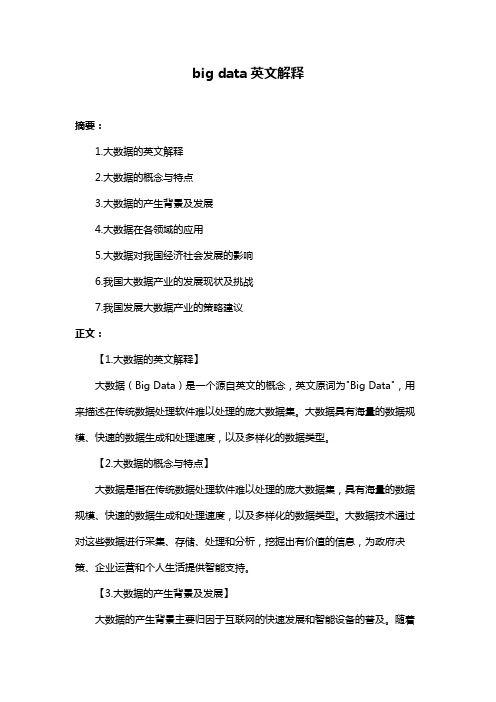
big data英文解释摘要:1.大数据的英文解释2.大数据的概念与特点3.大数据的产生背景及发展4.大数据在各领域的应用5.大数据对我国经济社会发展的影响6.我国大数据产业的发展现状及挑战7.我国发展大数据产业的策略建议正文:【1.大数据的英文解释】大数据(Big Data)是一个源自英文的概念,英文原词为"Big Data",用来描述在传统数据处理软件难以处理的庞大数据集。
大数据具有海量的数据规模、快速的数据生成和处理速度,以及多样化的数据类型。
【2.大数据的概念与特点】大数据是指在传统数据处理软件难以处理的庞大数据集,具有海量的数据规模、快速的数据生成和处理速度,以及多样化的数据类型。
大数据技术通过对这些数据进行采集、存储、处理和分析,挖掘出有价值的信息,为政府决策、企业运营和个人生活提供智能支持。
【3.大数据的产生背景及发展】大数据的产生背景主要归因于互联网的快速发展和智能设备的普及。
随着网络带宽的提高、数据存储能力的增强以及计算能力的提升,大数据技术得到了快速发展。
同时,政府、企业和个人对大数据的需求也日益旺盛,推动了大数据在各领域的广泛应用。
【4.大数据在各领域的应用】大数据技术已经在多个领域得到广泛应用,包括金融、医疗、教育、交通、智慧城市等。
例如,在金融领域,大数据技术可以用于信用评级、风险控制和精准营销;在医疗领域,可以通过大数据分析实现疾病预测和个性化医疗。
【5.大数据对我国经济社会发展的影响】大数据对我国经济社会发展具有重要意义。
首先,大数据技术可以提高政府决策效率,促进公共服务优化。
其次,大数据技术有助于企业实现精细化管理,提高市场竞争力。
最后,大数据技术丰富了个人信息获取途径,提升了民众的生活品质。
【6.我国大数据产业的发展现状及挑战】我国大数据产业发展迅速,已经形成了一批具有竞争力的大数据企业和产业园区。
然而,我国大数据产业仍面临诸多挑战,如数据资源开放程度不高、关键技术研发能力不足、人才短缺等。
写一篇关于大数据专业的英语作文
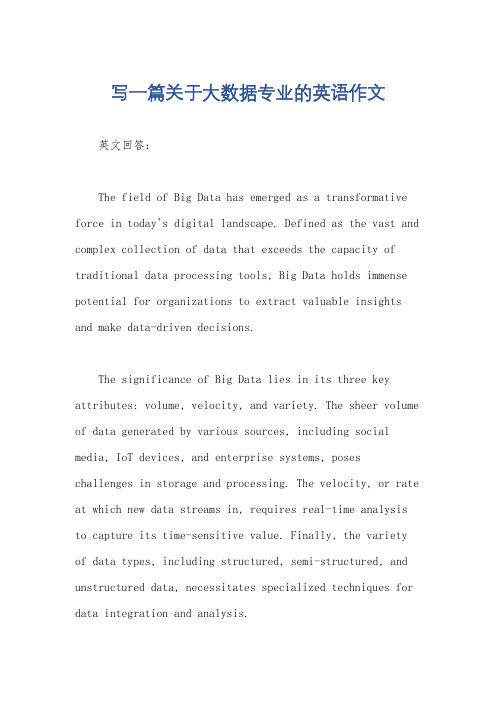
写一篇关于大数据专业的英语作文英文回答:The field of Big Data has emerged as a transformative force in today's digital landscape. Defined as the vast and complex collection of data that exceeds the capacity of traditional data processing tools, Big Data holds immense potential for organizations to extract valuable insights and make data-driven decisions.The significance of Big Data lies in its three key attributes: volume, velocity, and variety. The sheer volume of data generated by various sources, including social media, IoT devices, and enterprise systems, poses challenges in storage and processing. The velocity, or rate at which new data streams in, requires real-time analysis to capture its time-sensitive value. Finally, the variety of data types, including structured, semi-structured, and unstructured data, necessitates specialized techniques for data integration and analysis.The benefits of leveraging Big Data are multifaceted.It enables organizations to:Enhance decision-making: Data-driven insights empower businesses to make informed decisions, optimize processes, and predict market trends.Improve customer experience: By analyzing customer data, organizations can personalize experiences, anticipate preferences, and address pain points.Detect fraud and security breaches: Big Data analytics can detect anomalies and identify suspicious patterns in financial transactions and security logs.Drive innovation: Data-powered research and development foster innovation by identifying new opportunities and developing cutting-edge products and services.Increase operational efficiency: Data analysis canuncover inefficiencies, streamline operations, and optimize resource allocation.To harness the full potential of Big Data, organizations must invest in robust data management and analytics infrastructure. This includes scalable storage solutions, powerful processing engines, and specialized analytics tools. Additionally, skilled data scientists and engineers who possess expertise in data mining, statistical modeling, and machine learning are essential for extracting meaningful insights from vast data volumes.The impact of Big Data is not confined to the business world. It has profound implications for society as a whole:Healthcare: Big Data analytics can improve patient outcomes, optimize drug discovery, and personalize medical treatments.Environmental monitoring: Data from sensors and satellites helps track environmental changes, predict natural disasters, and protect ecosystems.Transportation: Data analysis can optimize traffic flow, improve vehicle efficiency, and enhancetransportation safety.Government: Big Data supports data-driven policymaking, fraud detection, and anti-corruption measures.As technology continues to advance, the volume, velocity, and variety of Big Data will only increase. This presents both opportunities and challenges fororganizations and society alike. By embracing the potential of Big Data and investing in data management and analytics capabilities, we can unlock unprecedented insights anddrive innovation for the benefit of future generations.中文回答:大数据专业。
大数据的力量 英语作文
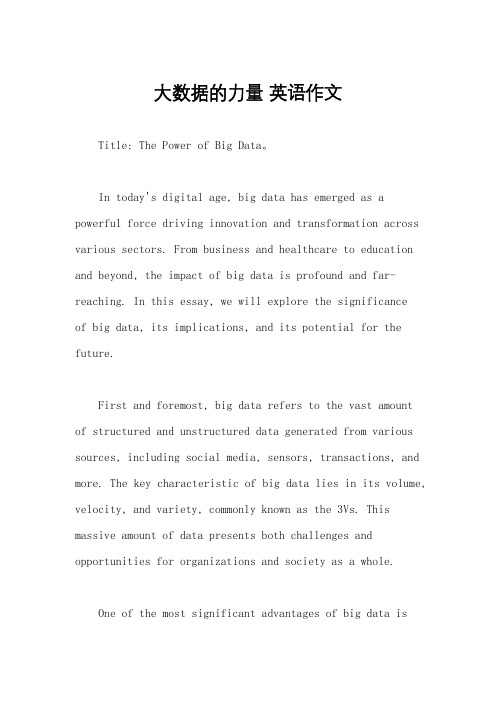
大数据的力量英语作文Title: The Power of Big Data。
In today's digital age, big data has emerged as a powerful force driving innovation and transformation across various sectors. From business and healthcare to education and beyond, the impact of big data is profound and far-reaching. In this essay, we will explore the significanceof big data, its implications, and its potential for the future.First and foremost, big data refers to the vast amountof structured and unstructured data generated from various sources, including social media, sensors, transactions, and more. The key characteristic of big data lies in its volume, velocity, and variety, commonly known as the 3Vs. This massive amount of data presents both challenges and opportunities for organizations and society as a whole.One of the most significant advantages of big data isits potential to drive informed decision-making. By analyzing large datasets, organizations can uncover valuable insights into customer behavior, market trends, and operational efficiency. For example, e-commerce companies utilize big data analytics to personalize recommendations for users based on their browsing history and purchase patterns, thereby enhancing the overall shopping experience and increasing sales.Moreover, big data plays a crucial role in advancing scientific research and innovation. In fields such as healthcare, genomics, and environmental science, the analysis of large datasets enables researchers to identify patterns, make predictions, and develop new treatments and technologies. For instance, in genomics, big data analytics facilitates the identification of genetic markers associated with diseases, leading to more precise diagnoses and personalized treatments.Furthermore, big data has revolutionized the way governments and policymakers address societal challenges. By leveraging data analytics, governments can gain insightsinto citizen needs, optimize resource allocation, and improve public services. For instance, city planners use big data to analyze traffic patterns and optimize transportation routes, reducing congestion and improvingair quality.However, along with its immense potential, big data also raises ethical and privacy concerns. As organizations collect and analyze vast amounts of personal data, there is a risk of privacy breaches and misuse of information. It is imperative for policymakers and industry stakeholders to establish robust data protection regulations and ethical guidelines to safeguard individuals' privacy rights while harnessing the power of big data.Looking ahead, the future of big data holds even greater promise. With advancements in artificial intelligence, machine learning, and data analytics technologies, organizations will be able to extract deeper insights and drive more impactful decisions. Additionally, the proliferation of Internet of Things (IoT) devices will further expand the scope of big data, as moreinterconnected devices generate data in real-time.In conclusion, big data is a transformative force that has revolutionized how organizations operate, how researchers conduct studies, and how governments address societal challenges. By harnessing the power of big data responsibly and ethically, we can unlock new opportunities for innovation, drive economic growth, and improve the quality of life for people around the world. As we continue to navigate the era of big data, it is essential to balance the benefits with the need to protect individual privacy and uphold ethical standards.。
大数据英语动词练习30题
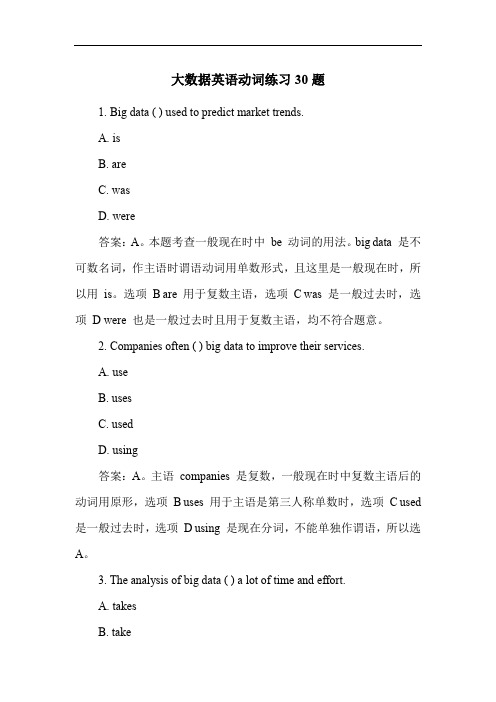
大数据英语动词练习30题1. Big data ( ) used to predict market trends.A. isB. areC. wasD. were答案:A。
本题考查一般现在时中be 动词的用法。
big data 是不可数名词,作主语时谓语动词用单数形式,且这里是一般现在时,所以用is。
选项B are 用于复数主语,选项C was 是一般过去时,选项D were 也是一般过去时且用于复数主语,均不符合题意。
2. Companies often ( ) big data to improve their services.A. useB. usesC. usedD. using答案:A。
主语companies 是复数,一般现在时中复数主语后的动词用原形,选项B uses 用于主语是第三人称单数时,选项C used 是一般过去时,选项D using 是现在分词,不能单独作谓语,所以选A。
3. The analysis of big data ( ) a lot of time and effort.A. takesB. takeC. tookD. taking答案:A。
主语是the analysis,是单数,一般现在时中单数主语后的动词要用第三人称单数形式,选项B take 用于复数主语,选项C took 是一般过去时,选项D taking 是现在分词,不能作谓语,所以选A。
4. Big data ( ) helpful for making business decisions.A. isB. areC. wasD. were答案:A。
big data 是不可数名词,作主语时谓语动词用单数形式,且这里是一般现在时,所以用is。
选项B are 用于复数主语,选项C was 是一般过去时,选项D were 也是一般过去时且用于复数主语,均不符合题意。
5. We ( ) big data to understand customer preferences.A. useB. usesC. usedD. using答案:A。
大数据作文开头结尾
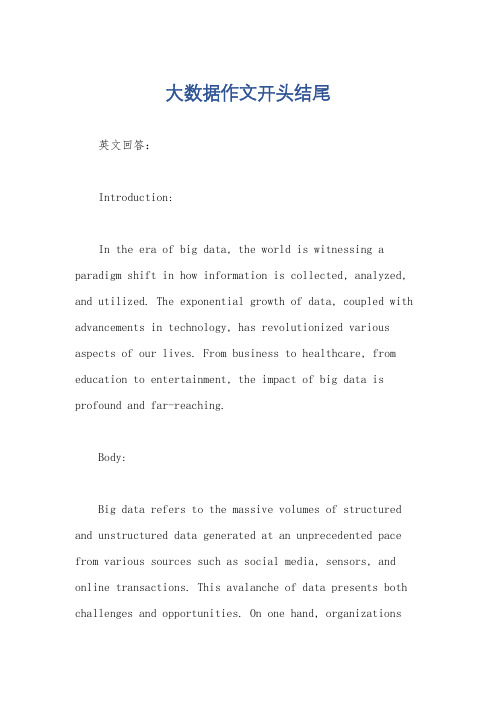
大数据作文开头结尾英文回答:Introduction:In the era of big data, the world is witnessing a paradigm shift in how information is collected, analyzed, and utilized. The exponential growth of data, coupled with advancements in technology, has revolutionized various aspects of our lives. From business to healthcare, from education to entertainment, the impact of big data is profound and far-reaching.Body:Big data refers to the massive volumes of structured and unstructured data generated at an unprecedented pace from various sources such as social media, sensors, and online transactions. This avalanche of data presents both challenges and opportunities. On one hand, organizationsstruggle to manage, process, and derive insights from this vast amount of information. On the other hand, big data analytics enables businesses to gain valuable insights into consumer behavior, market trends, and operational efficiency.For instance, e-commerce giants like Amazon and Alibaba leverage big data analytics to personalize product recommendations for millions of users, thereby enhancing the shopping experience and increasing sales. Similarly, healthcare institutions utilize big data to predict disease outbreaks, optimize treatment plans, and improve patient outcomes. In education, educators analyze student performance data to tailor teaching strategies and interventions, fostering better learning outcomes.Furthermore, big data plays a crucial role in decision-making processes across industries. By analyzing historical data and real-time information, businesses can make informed decisions regarding resource allocation, risk management, and strategic planning. Governments utilize big data analytics for policy formulation, law enforcement, andpublic service optimization.Conclusion:In conclusion, the era of big data presents immense opportunities for innovation, growth, and societal advancement. However, harnessing the full potential of big data requires overcoming challenges such as data privacy concerns, cybersecurity threats, and ethical considerations. By leveraging advanced analytics tools, adopting data-driven approaches, and fostering collaboration, we can unlock the transformative power of big data to create a better future for all.中文回答:开头:在大数据时代,世界正在经历信息收集、分析和利用方式的转变。
大数据英文版

大数据英文版Big Data: Revolutionizing the WorldIntroduction:In the era of digitalization, data has become the new oil, and harnessing its power has become crucial for businesses and industries worldwide. Big data, a term that refers to the vast amount of structured and unstructured data, is transforming the way we live, work, and make decisions. This article aims to provide a comprehensive overview of big data, its significance, and its impact on various sectors.1. What is Big Data?Big data refers to extremely large and complex data sets that cannot be effectively managed, processed, or analyzed using traditional data processing methods. It encompasses both structured data (e.g., numbers, dates) and unstructured data (e.g., text, images, videos). The three main characteristics of big data are volume, velocity, and variety.2. The Importance of Big Data:2.1 Decision Making and Insights:Big data analytics enables organizations to gain valuable insights from large datasets, facilitating data-driven decision making. By analyzing patterns, trends, and correlations, businesses can optimize operations, identify new opportunities, and predict future trends. For example, a retail company can analyze customer purchasing behavior to personalize marketing campaigns and improve customer satisfaction.2.2 Innovation and Competitive Advantage:Big data fuels innovation by providing organizations with the ability to uncover hidden patterns and relationships. By leveraging big data analytics, companies can develop new products and services that meet customer needs more effectively. Thisenhances their competitive advantage and allows them to stay ahead in the market. For instance, healthcare providers can use big data to develop personalized treatment plans based on patient data, leading to improved healthcare outcomes.2.3 Customer Experience and Personalization:Big data enables organizations to understand their customers better and deliver personalized experiences. By analyzing customer preferences, behavior, and feedback, companies can tailor their offerings to individual needs. This enhances customer satisfaction and loyalty. For example, streaming platforms like Netflix use big data algorithms to recommend personalized content to users based on their viewing history and preferences.3. Impact of Big Data on Various Sectors:3.1 Healthcare:Big data has revolutionized healthcare by improving patient care, disease prevention, and research. Electronic health records, wearable devices, and genetic data contribute to massive amounts of healthcare data. By analyzing this data, healthcare providers can identify disease patterns, predict outbreaks, and develop personalized treatment plans. Moreover, big data analytics can help identify potential drug interactions and adverse effects, enhancing patient safety.3.2 Retail:Big data analytics has transformed the retail industry by enabling personalized marketing, inventory optimization, and demand forecasting. By analyzing customer data, retailers can understand buying behavior, preferences, and trends. This allows them to tailor marketing campaigns, offer personalized recommendations, and optimize pricing strategies. Additionally, big data analytics helps retailers optimize inventory levels, reducing costs and minimizing out-of-stock situations.3.3 Finance:Big data plays a crucial role in the finance sector, enabling fraud detection, risk assessment, and algorithmic trading. By analyzing large volumes of financial data, banks and financial institutions can identify suspicious activities and prevent fraudulent transactions. Big data analytics also helps assess credit risk, predict market trends, and optimize investment strategies. Furthermore, algorithmic trading uses big data analytics to make real-time trading decisions based on market data and patterns.4. Challenges and Considerations:4.1 Privacy and Security:As big data involves the collection and analysis of vast amounts of personal information, privacy and security concerns arise. Organizations must ensure compliance with data protection regulations and implement robust security measures to protect sensitive data from unauthorized access and breaches.4.2 Data Quality and Integration:Ensuring the accuracy, completeness, and consistency of data is essential for reliable analysis and decision making. Data integration from various sources can be challenging due to differences in formats, structures, and quality. Organizations must invest in data cleansing and integration processes to ensure high-quality data for analysis.4.3 Skill Gap:The growing demand for big data analytics professionals has created a skill gap in the industry. Organizations need skilled data scientists, analysts, and engineers who can effectively analyze and interpret big data. Bridging this gap requires investing in training programs and fostering a data-driven culture within organizations.Conclusion:Big data is transforming the world by providing organizations with valuable insights, driving innovation, and enhancing decision-making processes. Its impact spans across various sectors, including healthcare, retail, and finance. However, organizations must address challenges related to privacy, data quality, and skill gaps to fully leverage thepotential of big data. By embracing big data analytics, businesses can gain a competitive edge and thrive in the digital age.。
使用大数据的目的英语作文
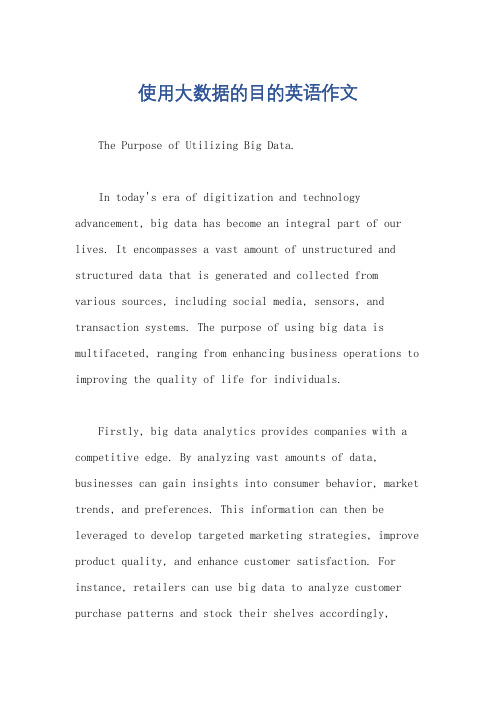
使用大数据的目的英语作文The Purpose of Utilizing Big Data.In today's era of digitization and technology advancement, big data has become an integral part of our lives. It encompasses a vast amount of unstructured and structured data that is generated and collected from various sources, including social media, sensors, and transaction systems. The purpose of using big data is multifaceted, ranging from enhancing business operations to improving the quality of life for individuals.Firstly, big data analytics provides companies with a competitive edge. By analyzing vast amounts of data, businesses can gain insights into consumer behavior, market trends, and preferences. This information can then be leveraged to develop targeted marketing strategies, improve product quality, and enhance customer satisfaction. For instance, retailers can use big data to analyze customer purchase patterns and stock their shelves accordingly,reducing the chances of stockouts or overstocking. Similarly, healthcare organizations can leverage big data to identify patterns in patient care, leading to more effective treatment methods and personalized care plans.Moreover, big data can be used to improve decision-making processes. Traditional data analysis methods often rely on small samples or assumptions, which may not provide a complete picture. By contrast, big data analysis allows for a more comprehensive understanding of complex systems, enabling more informed and accurate decisions. This is particularly useful in fields like finance, where big data can help identify potential risks and opportunities, leading to better investment decisions.Additionally, big data has the potential to revolutionize the way we live our lives. It can be used to monitor and improve various aspects of urban planning, such as traffic flow, energy consumption, and public safety. By analyzing real-time data from sensors and other sources, cities can become more efficient, sustainable, and livable. Similarly, big data can be used to address social issueslike poverty and crime by providing insights into theirroot causes and enabling more targeted interventions.Furthermore, big data can enhance research and development in various fields. Scientists and researchers can use big data to identify patterns and trends in their field of study, leading to new discoveries and advancements. For instance, in the field of genomics, big data analysis has enabled researchers to identify genetic markers for diseases and develop more effective treatment methods. Similarly, in the field of artificial intelligence, bigdata has been used to train machines to perform complex tasks like image recognition and language translation.However, it is important to note that the use of big data also raises concerns about privacy and security. As more and more personal information is collected and stored, the risk of data breaches and misuse increases. Therefore,it is crucial to ensure that big data is handledresponsibly and ethically, with appropriate safeguards to protect the privacy and rights of individuals.In conclusion, the purpose of using big data is diverse and far-reaching. It enables businesses to gain a competitive edge, improves decision-making processes, revolutionizes urban planning, addresses social issues, and enhances research and development. However, we must also be mindful of the associated risks and ensure that big data is used responsibly and ethically. As we continue to harness the power of big data, we stand to make significant progress in various fields, leading to a better and more connected world.。
大数据应用的英文作文
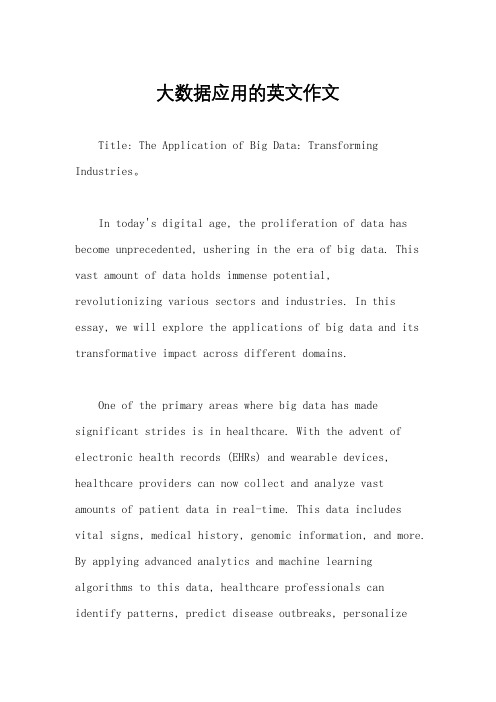
大数据应用的英文作文Title: The Application of Big Data: Transforming Industries。
In today's digital age, the proliferation of data has become unprecedented, ushering in the era of big data. This vast amount of data holds immense potential,revolutionizing various sectors and industries. In this essay, we will explore the applications of big data and its transformative impact across different domains.One of the primary areas where big data has made significant strides is in healthcare. With the advent of electronic health records (EHRs) and wearable devices, healthcare providers can now collect and analyze vast amounts of patient data in real-time. This data includesvital signs, medical history, genomic information, and more. By applying advanced analytics and machine learning algorithms to this data, healthcare professionals canidentify patterns, predict disease outbreaks, personalizetreatments, and improve overall patient care. For example, predictive analytics can help identify patients at risk of developing chronic conditions such as diabetes or heart disease, allowing for proactive interventions to prevent or mitigate these conditions.Another sector that has been transformed by big data is finance. In the financial industry, data-driven algorithms are used for risk assessment, fraud detection, algorithmic trading, and customer relationship management. By analyzing large volumes of financial transactions, market trends, and customer behavior, financial institutions can make more informed decisions, optimize investment strategies, and enhance the customer experience. For instance, banks employ machine learning algorithms to detect suspicious activities and prevent fraudulent transactions in real-time, safeguarding both the institution and its customers.Furthermore, big data has revolutionized the retail sector, empowering companies to gain deeper insights into consumer preferences, shopping behaviors, and market trends. Through the analysis of customer transactions, browsinghistory, social media interactions, and demographic data, retailers can personalize marketing campaigns, optimize pricing strategies, and enhance inventory management. For example, e-commerce platforms utilize recommendation systems powered by machine learning algorithms to suggest products based on past purchases and browsing behavior, thereby improving customer engagement and driving sales.The transportation industry is also undergoing a profound transformation fueled by big data. With the proliferation of GPS-enabled devices, sensors, andtelematics systems, transportation companies can collect vast amounts of data on vehicle performance, traffic patterns, weather conditions, and logistics operations. By leveraging this data, companies can optimize route planning, reduce fuel consumption, minimize delivery times, and enhance overall operational efficiency. For instance, ride-sharing platforms use predictive analytics to forecast demand, allocate drivers more effectively, and optimizeride routes, resulting in improved service quality and customer satisfaction.In addition to these sectors, big data is making significant strides in fields such as manufacturing, agriculture, energy, and government. In manufacturing, data analytics is used for predictive maintenance, quality control, and supply chain optimization. In agriculture, precision farming techniques enabled by big data help optimize crop yields, minimize resource usage, and mitigate environmental impact. In energy, smart grid technologies leverage big data analytics to optimize energy distribution, improve grid reliability, and promote energy efficiency. In government, big data is utilized for urban planning, public safety, healthcare management, and policy formulation.In conclusion, the application of big data is transforming industries across the globe, enabling organizations to make data-driven decisions, unlock new insights, and drive innovation. From healthcare and finance to retail and transportation, the impact of big data is profound and far-reaching. As we continue to harness the power of data analytics and machine learning, we can expect further advancements and breakthroughs that will shape the future of our society and economy.。
大数据领域英文作文
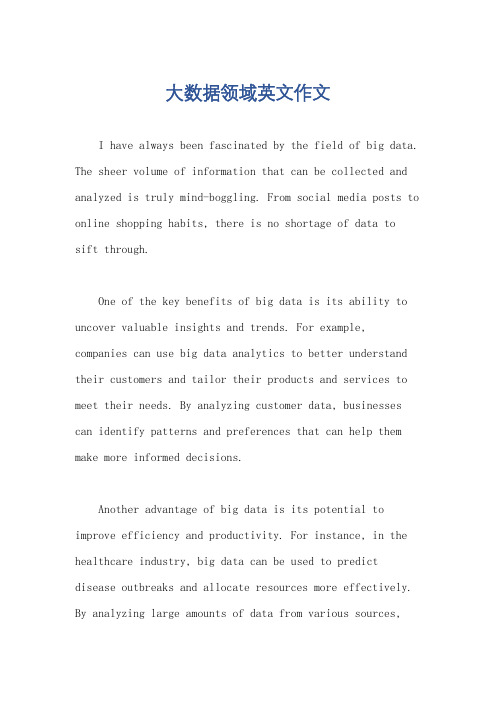
大数据领域英文作文I have always been fascinated by the field of big data. The sheer volume of information that can be collected and analyzed is truly mind-boggling. From social media posts to online shopping habits, there is no shortage of data tosift through.One of the key benefits of big data is its ability to uncover valuable insights and trends. For example, companies can use big data analytics to better understand their customers and tailor their products and services to meet their needs. By analyzing customer data, businesses can identify patterns and preferences that can help them make more informed decisions.Another advantage of big data is its potential to improve efficiency and productivity. For instance, in the healthcare industry, big data can be used to predict disease outbreaks and allocate resources more effectively. By analyzing large amounts of data from various sources,healthcare providers can identify trends and patterns that can help them make faster and more accurate diagnoses.Overall, big data has the power to revolutionize industries and drive innovation. However, it is important to remember that with great power comes great responsibility. It is crucial to handle data ethically and ensure that privacy and security are always top priorities.In conclusion, big data is a powerful tool that has the potential to transform the way we live and work. By harnessing the power of data analytics, we can unlock valuable insights and drive positive change in our world.---。
大数据的力量 英语作文
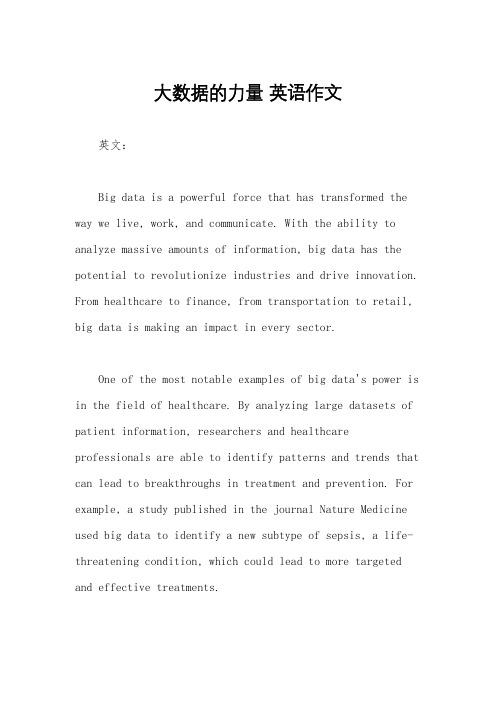
大数据的力量英语作文英文:Big data is a powerful force that has transformed the way we live, work, and communicate. With the ability to analyze massive amounts of information, big data has the potential to revolutionize industries and drive innovation. From healthcare to finance, from transportation to retail, big data is making an impact in every sector.One of the most notable examples of big data's power is in the field of healthcare. By analyzing large datasets of patient information, researchers and healthcare professionals are able to identify patterns and trends that can lead to breakthroughs in treatment and prevention. For example, a study published in the journal Nature Medicine used big data to identify a new subtype of sepsis, a life-threatening condition, which could lead to more targeted and effective treatments.Another area where big data is making a significant impact is in the world of e-commerce. Companies like Amazon and Alibaba use big data to track customer behavior and preferences, allowing them to offer personalized recommendations and targeted advertising. This not only improves the customer experience but also drives sales and revenue for these companies.In addition to these examples, big data is also being used in transportation to optimize traffic flow and reduce congestion, in finance to detect fraud and manage risk, and in agriculture to improve crop yields and minimize environmental impact. The possibilities are endless when it comes to harnessing the power of big data.中文:大数据是一股强大的力量,它已经改变了我们生活、工作和交流的方式。
大数据英语作文
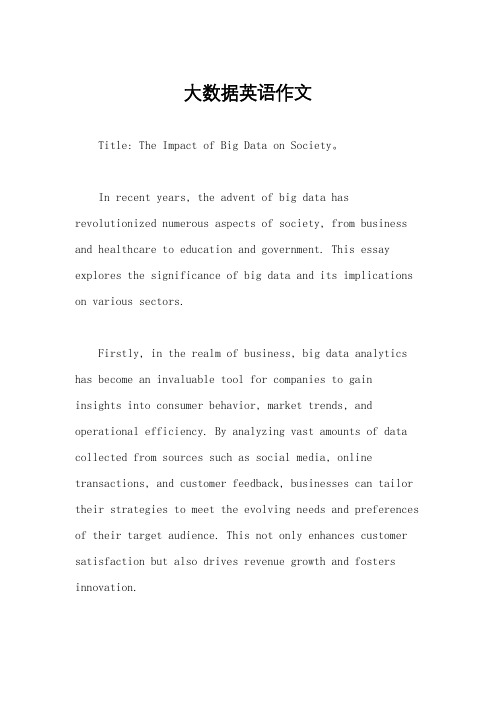
大数据英语作文Title: The Impact of Big Data on Society。
In recent years, the advent of big data has revolutionized numerous aspects of society, from business and healthcare to education and government. This essay explores the significance of big data and its implications on various sectors.Firstly, in the realm of business, big data analytics has become an invaluable tool for companies to gaininsights into consumer behavior, market trends, and operational efficiency. By analyzing vast amounts of data collected from sources such as social media, online transactions, and customer feedback, businesses can tailor their strategies to meet the evolving needs and preferences of their target audience. This not only enhances customer satisfaction but also drives revenue growth and fosters innovation.Moreover, big data has profoundly impacted the healthcare industry by enabling predictive analytics, personalized medicine, and disease prevention. Through the analysis of genomic data, electronic health records, and medical imaging, healthcare professionals can make more accurate diagnoses, identify at-risk populations, and develop targeted interventions. As a result, patient outcomes are improved, healthcare costs are reduced, and public health initiatives are more effectively implemented.In the field of education, big data has the potential to revolutionize teaching and learning processes. By tracking student performance, identifying learning gaps, and assessing instructional effectiveness, educators can personalize learning experiences and optimize educational outcomes. Additionally, big data analytics can inform curriculum development, resource allocation, and policy-making decisions, ultimately leading to a more equitable and inclusive education system.Furthermore, big data has transformed the way governments operate and deliver services to citizens. Byanalyzing data from various sources, including sensors, satellites, and administrative records, governments can enhance public safety, optimize urban planning, and improve service delivery in areas such as transportation, healthcare, and public utilities. Additionally, big data analytics can enable more transparent and accountable governance by providing insights into government performance, resource allocation, and policy impact.However, the widespread adoption of big data also raises concerns regarding privacy, security, and ethical implications. The collection and analysis of vast amounts of personal data raise questions about individual privacy rights and data ownership. Moreover, the potential misuse of data for surveillance, discrimination, or manipulation underscores the importance of establishing robust regulatory frameworks and ethical guidelines to govern the responsible use of big data.In conclusion, big data has emerged as a transformative force with far-reaching implications for society. While it offers unprecedented opportunities for innovation,efficiency, and improvement across various sectors, it also presents challenges related to privacy, security, and ethics. Therefore, it is essential for stakeholders to collaborate and develop strategies that harness the power of big data while safeguarding individual rights and societal values. Only then can we fully realize the potential benefits of big data in shaping a better future for humanity.。
大数据的英语作文
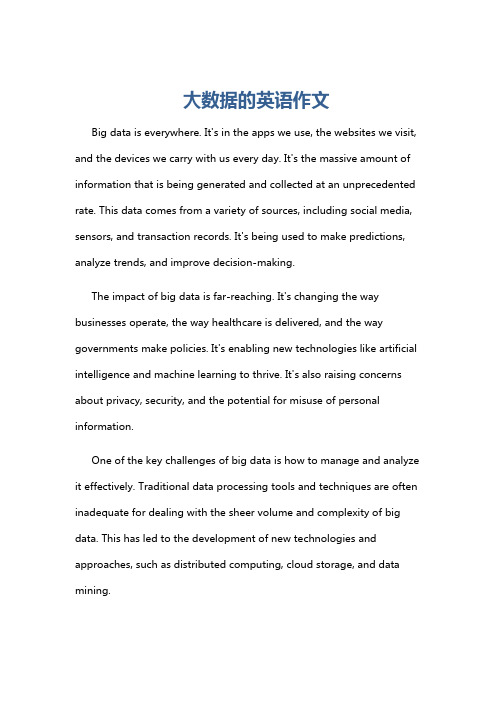
大数据的英语作文Big data is everywhere. It's in the apps we use, the websites we visit, and the devices we carry with us every day. It's the massive amount of information that is being generated and collected at an unprecedented rate. This data comes from a variety of sources, including social media, sensors, and transaction records. It's being used to make predictions, analyze trends, and improve decision-making.The impact of big data is far-reaching. It's changing the way businesses operate, the way healthcare is delivered, and the way governments make policies. It's enabling new technologies like artificial intelligence and machine learning to thrive. It's also raising concerns about privacy, security, and the potential for misuse of personal information.One of the key challenges of big data is how to manage and analyze it effectively. Traditional data processing tools and techniques are often inadequate for dealing with the sheer volume and complexity of big data. This has led to the development of new technologies and approaches, such as distributed computing, cloud storage, and data mining.Despite its potential, big data also comes with its fair share of limitations. It's not a silver bullet that can solve all problems. There are still issues around data quality, data governance, and ethical considerations. And as more and more data is being generated, there are concerns about the environmental impact of storing and processing it.In conclusion, big data is a game-changer in the modern world. It's transforming industries, driving innovation, and shaping the way we live and work. But it also poses challenges that need to be addressed. As we continue to harness the power of big data, it's important to strike a balance between its benefits and its drawbacks.。
The Role of Big Data in Predictive Analytics
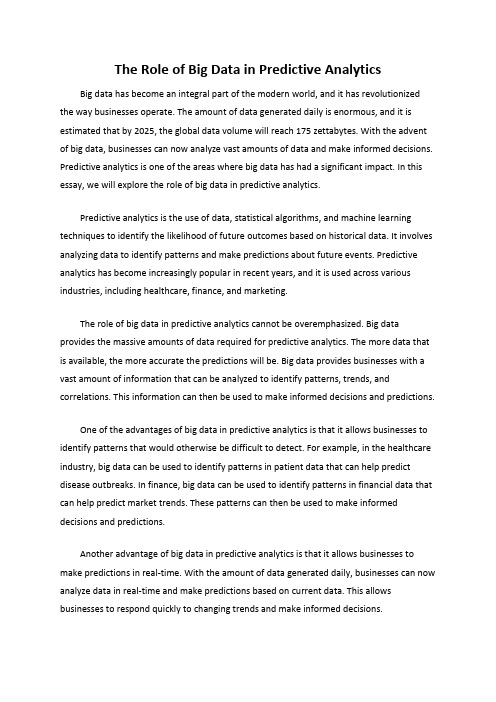
The Role of Big Data in Predictive Analytics Big data has become an integral part of the modern world, and it has revolutionized the way businesses operate. The amount of data generated daily is enormous, and it is estimated that by 2025, the global data volume will reach 175 zettabytes. With the advent of big data, businesses can now analyze vast amounts of data and make informed decisions. Predictive analytics is one of the areas where big data has had a significant impact. In this essay, we will explore the role of big data in predictive analytics.Predictive analytics is the use of data, statistical algorithms, and machine learning techniques to identify the likelihood of future outcomes based on historical data. It involves analyzing data to identify patterns and make predictions about future events. Predictive analytics has become increasingly popular in recent years, and it is used across various industries, including healthcare, finance, and marketing.The role of big data in predictive analytics cannot be overemphasized. Big data provides the massive amounts of data required for predictive analytics. The more data that is available, the more accurate the predictions will be. Big data provides businesses with a vast amount of information that can be analyzed to identify patterns, trends, and correlations. This information can then be used to make informed decisions and predictions.One of the advantages of big data in predictive analytics is that it allows businesses to identify patterns that would otherwise be difficult to detect. For example, in the healthcare industry, big data can be used to identify patterns in patient data that can help predict disease outbreaks. In finance, big data can be used to identify patterns in financial data that can help predict market trends. These patterns can then be used to make informed decisions and predictions.Another advantage of big data in predictive analytics is that it allows businesses to make predictions in real-time. With the amount of data generated daily, businesses can now analyze data in real-time and make predictions based on current data. This allows businesses to respond quickly to changing trends and make informed decisions.However, there are also challenges associated with big data in predictive analytics. One of the challenges is the quality of data. Big data is often unstructured, and it can be challenging to ensure that the data is of high quality. Poor quality data can lead to inaccurate predictions, which can have a significant impact on businesses.Another challenge is the complexity of big data. Big data is often complex and requires specialized skills to analyze. This can be a challenge for businesses that do not have the necessary skills and expertise to analyze big data. Businesses may need to hire data scientists or outsource the analysis of big data to third-party companies.In conclusion, big data has played a significant role in predictive analytics. It has provided businesses with vast amounts of data that can be analyzed to identify patterns, trends, and correlations. This information can then be used to make informed decisions and predictions. However, there are also challenges associated with big data in predictive analytics, such as the quality and complexity of data. Despite these challenges, big data is expected to continue to play a significant role in predictive analytics in the future.。
- 1、下载文档前请自行甄别文档内容的完整性,平台不提供额外的编辑、内容补充、找答案等附加服务。
- 2、"仅部分预览"的文档,不可在线预览部分如存在完整性等问题,可反馈申请退款(可完整预览的文档不适用该条件!)。
- 3、如文档侵犯您的权益,请联系客服反馈,我们会尽快为您处理(人工客服工作时间:9:00-18:30)。
多样性
大数据的用处
• • • • • 帮助企业掌握情况,分析问题,找到问题 数据挖掘,预测未来 用户行为分析 推荐系统/广告系统 google依据网民搜索,分析全球范围内流感 等病疫的传播状况 • Farecast预测机票价格 • …
如何做
• 土豪
– ***(IBM/EMC[VMWare]/Intel)解决方案
DW
Select Merge Clean
User Hotel Explicit Implicit
train set test set
User_feature Hotel_feature User_bias Hotel_bias
UBT
yes
Similarity Candidate merge hotel hotel
• 常规方案 (开源方案+定制)
– – – – – Hadoop (Hive) Storm / S4: Simple Scalable Streaming System Cloudera Impala / Spark Redis/Memcached MySQL / MongoDB
• 选型
– 开源是一种商业模式,没有免费的午餐 – 在TCO,Service和Customization等方面权衡 – 选择最合适自己的的产品和技术
– UBT+业务订单库
• 鹰眼
推荐
推荐系统 - Framework
Recommendations (smart data)
User Model (+rules)
User-Hotel Preference Model (+rules)
Hotel Model (+rules)
User-related data
支持游标定位 支持数据重放 支持日志轮转 支持压缩传输
UBT – Storm Stream Processing
采用transaction方式(Trident Storm) 故障自动回复 实时统计,metrics写入dashboard
每个session内所有感兴趣的事件 外站来源统计 主要页面的转换率 A/B测试结果 ……
ห้องสมุดไป่ตู้
Explicit Data
(Rating, review, vote)
Implicit Data
(Purchase, Follow, Click)
Hotel-related data
Big Data (Data Source)
推荐系统 - Process
Hotel similarity
core Top 10 (svd)
大数据之路 及携程相关实践
技术部 刘普功
Not just their interfaces, but understand the implementations (at least at a high level) –Jeff Dean, Software engineering advice from building large-scale distributed systems
Hbase/Hadoop
Clog – Browser
Clog - Export
Cdata Portal - UBT
UBT - Overview
UBT – 数据收集
前端页面JS埋点(JS框架支持) Nginx接收回传数据,输出到syslog Ctail服务读取syslog,作为spout数据源
基础UBT数据实时推送到UBT Push Service
保存到Hadoop/Hbase 推送给某些实时业务服务
UBT - Browser
BI
• Reports
– 实时性问题 – 解决方法:放弃Reportdb,直接读取个业务的 订单库的读库
• PV/UV/转化率
– 数据来源:UBT
• 横向业绩
user category
display
guest/normal
Top 10
User preference
User
虚拟化+运营自动化
• 之前存在的问题:
– – – –
– – – – – –
服务器上线长,主要靠手工安装 全部是实体机,随着业务发展,机房不够用 服务器规格不一致,特定配置比较多 Clean Build不支持
– 指的是所涉及的资料量规模巨大到 无法透过目前主流软件工具,在合理时间内达 到撷取、管理、处理、并整理成为帮助企业经 营决策更积极目的的资讯
• 特征
– 全量数据 – 混杂性 – 重相关性不重因果
大数据特征
多样性
速度
数据量
大数据特征
数据量
Validity 扩散性 有效性 Value 价值
速度
数据黏性
SQL vs NoSQL
• NoSQL源于:Domino 和BigTable • ACID vs BASE • CAP定律:
– Consistency 一致性 – Availability 可用性 – Partition tolerance 分区容忍性 – 三者不可得兼
• 提及大数据绕不开Hadoop及MapReduce
Dashboard – Trace Log Demo
Dashboard – Trace Log Demo (Cont.)
Clog - Overview
用户 行为 酒店 机票 度假
Logs/Traces/Metrics/Events/Impressions/…
Central Logging
Reliable Multicast
大数据之路
• Agenda
– 什么是数据和大数据 – 数据处理之演化 – 携程大数据方面的实践
• TED Video: The quantified self by Gary Wolf 2010
DIKM模型
数据的定义
数据 主数据 主数据 关系数据 元 数 据
交易数据
数据的发展趋势
大数据
• 定义
建立基于OpenStack的云平台 服务器标准化 多数据中心 虚拟化,非必要新服务器使用虚拟机 NOC+eWatch Clean Build
• 虚拟化+自动化
Reference
• • • • • • • • http://conf/pages/viewpage.action?pageId=12669341 http://conf/pages/viewpage.action?pageId=23874077 /index.html /index.html / /p/twitter-storm /s4/ /2012/02/27/mondaysmusings-beyond-the-three-vs-of-big-data-viscosity-andvirality/ • http://kkovacs.eu/cassandra-vs-mongodb-vs-couchdb-vsredis
Map/Reduce
天猫推荐总体情况-架构
Detail 给我推荐 天猫/淘宝 首页 logo 推荐 会员俱乐部推荐 图书城推荐
前端
匹配层 装配(参数化) 用户实时 意图计算 Ranker(CTR 预估) 检索 推荐实体索引 离线实验 框架 在线实验 框架
Hadoop集群
MPI集群
Spark集群
乐视网 -豪华七件套
腾讯的NoSQL使用
富士通车载设备流式计算
虚拟化
• 为什么
– 节约成本 – 简化运营维护 – 充分利用现有硬件资源 – 专业化
• Cons
– 应用复杂度增加 – 自动化要求高,监控要求高 – 需要支持故障自动转移
携程大数据处理
• • • • • Clog UBT BI 推荐 虚拟化
